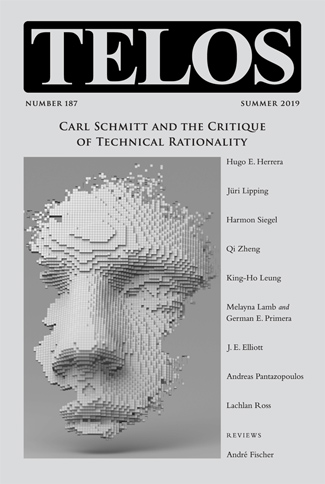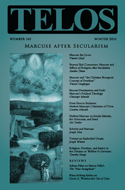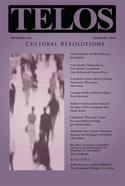Melayna Lamb and German E. Primera’s “Sovereignty between the Katechon and the Eschaton: Rethinking the Leviathan” appears in Telos 187 (Summer 2019). Read the full article at the Telos Online website, or purchase a print copy of the issue in our online store. Individual subscriptions to Telos are available in both print and online formats.
 This paper both rejects the reading of Thomas Hobbes’s Leviathan as a secularized katechon and rethinks anew the questions of sovereignty and politics in his thought. It does so by examining the eschatological character of his politico-theological understanding of the relation between the kingdom of the Leviathan and the kingdom of God. Indeed, through different contemporary readings of Hobbes’s theory of the state, this paper offers an insight into the concrete eschatology at operation in Hobbes’s thought and underscores its relevance for the understanding of government, biopolitics, and sovereignty. This is achieved through two different, albeit interconnected undertakings, which in turn allow us to agree but also to go beyond Giorgio Agamben’s claim that the state, in Hobbes, does not have a katechontic function. The first is an exposition of the a-teleological character of Hobbes’s eschatology and his metaphysics of motion. The second involves a consideration of the temporality and the nature of the relation between the ahistorical world of reason and the historical world of faith that underpins Hobbes’s theory of the state. Contrary to the contemporary interpretations in which Hobbes’s eschatology is presented as future regarding, we will highlight the chronological coincidence between the historical time of faith and the ahistorical time of the Leviathan, placing Hobbes within the political coordinates of Walter Benjamin’s messianism. By bringing this eschatological perspective to the fore, not only will the reading of Hobbes’s theory of sovereignty that aligns him with liberalism be problematized, but also an analysis of the resources that Hobbes offers to imagine a different form of politics will be developed. This paper both rejects the reading of Thomas Hobbes’s Leviathan as a secularized katechon and rethinks anew the questions of sovereignty and politics in his thought. It does so by examining the eschatological character of his politico-theological understanding of the relation between the kingdom of the Leviathan and the kingdom of God. Indeed, through different contemporary readings of Hobbes’s theory of the state, this paper offers an insight into the concrete eschatology at operation in Hobbes’s thought and underscores its relevance for the understanding of government, biopolitics, and sovereignty. This is achieved through two different, albeit interconnected undertakings, which in turn allow us to agree but also to go beyond Giorgio Agamben’s claim that the state, in Hobbes, does not have a katechontic function. The first is an exposition of the a-teleological character of Hobbes’s eschatology and his metaphysics of motion. The second involves a consideration of the temporality and the nature of the relation between the ahistorical world of reason and the historical world of faith that underpins Hobbes’s theory of the state. Contrary to the contemporary interpretations in which Hobbes’s eschatology is presented as future regarding, we will highlight the chronological coincidence between the historical time of faith and the ahistorical time of the Leviathan, placing Hobbes within the political coordinates of Walter Benjamin’s messianism. By bringing this eschatological perspective to the fore, not only will the reading of Hobbes’s theory of sovereignty that aligns him with liberalism be problematized, but also an analysis of the resources that Hobbes offers to imagine a different form of politics will be developed.
Continue reading →
By Caroline Edwards · Thursday, February 6, 2014 Caroline Edwards’s “From Eros to Eschaton: Herbert Marcuse’s Liberation of Time” appears in Telos 165 (Winter 2013). Read the full version online at the Telos Online website, or purchase a print copy of the issue in our store.
 This article explores what Gershom Scholem has called Herbert Marcuse’s “unacknowledged ties to [his] Jewish heritage.” At the core of Marcuse’s vision of transformed, non-repressive social relations, I argue, is a struggle over time, which rests upon a distinctly Jewish approach to the twin questions of remembrance and redemption. One example of this approach is the temporal dialectic between alienated labor time and the timelessness of pleasure’s desire for eternity, which underpins Marcuse’s analysis in Eros and Civilization (1956). This dialectic rests upon Marcuse’s reading of the Freudian Eros-Todestrieb dualism, whose phylogenetic reading of patricide has been read by critics as reformulating the biblical rebellion against an authoritarian Yahweh. This article explores what Gershom Scholem has called Herbert Marcuse’s “unacknowledged ties to [his] Jewish heritage.” At the core of Marcuse’s vision of transformed, non-repressive social relations, I argue, is a struggle over time, which rests upon a distinctly Jewish approach to the twin questions of remembrance and redemption. One example of this approach is the temporal dialectic between alienated labor time and the timelessness of pleasure’s desire for eternity, which underpins Marcuse’s analysis in Eros and Civilization (1956). This dialectic rests upon Marcuse’s reading of the Freudian Eros-Todestrieb dualism, whose phylogenetic reading of patricide has been read by critics as reformulating the biblical rebellion against an authoritarian Yahweh.
Continue reading →
By Greg Melleuish and Susanna Rizzo · Friday, September 13, 2013 Greg Melleuish and Susanna Rizzo’s “From Secular Temporality to Post-Secular Timelessness: Trekking the Past’s Future and Future’s Past” appears in Telos 163 (Summer 2013). Read the full version online at the Telos Online website, or purchase a print copy of the issue in our store.
 This essay is built on the assumption that History is as much about the future as it is about the past and that there is a “politics of history” that determines the relationship of the past to the present and the future. The secularization thesis created a model of history in which human beings passed from a condition in which they were religious, primitive, and querulous to one in which they were moving toward a world that would be not only secular but also peaceful. At the same time, the end of History can be understood in eschatological terms in which we are always at the end of days waiting for the purging that will allow the purpose of History to be fulfilled. The return of religion destroys this narrative and allows others to return, including History as irony and the possibility of the story as a denial of History. Post-secular History reflects both the crumbling of this once certain narrative and the legitimacy of the modern state that was built on that narrative. It is a crisis of authority, as can be seen in the proliferation of views and ideas that can be found on the world wide web, and the seeming erosion of the capacity of historians to control History and structure its narratives. This essay is built on the assumption that History is as much about the future as it is about the past and that there is a “politics of history” that determines the relationship of the past to the present and the future. The secularization thesis created a model of history in which human beings passed from a condition in which they were religious, primitive, and querulous to one in which they were moving toward a world that would be not only secular but also peaceful. At the same time, the end of History can be understood in eschatological terms in which we are always at the end of days waiting for the purging that will allow the purpose of History to be fulfilled. The return of religion destroys this narrative and allows others to return, including History as irony and the possibility of the story as a denial of History. Post-secular History reflects both the crumbling of this once certain narrative and the legitimacy of the modern state that was built on that narrative. It is a crisis of authority, as can be seen in the proliferation of views and ideas that can be found on the world wide web, and the seeming erosion of the capacity of historians to control History and structure its narratives.
Continue reading →
|
|
 This paper both rejects the reading of Thomas Hobbes’s Leviathan as a secularized katechon and rethinks anew the questions of sovereignty and politics in his thought. It does so by examining the eschatological character of his politico-theological understanding of the relation between the kingdom of the Leviathan and the kingdom of God. Indeed, through different contemporary readings of Hobbes’s theory of the state, this paper offers an insight into the concrete eschatology at operation in Hobbes’s thought and underscores its relevance for the understanding of government, biopolitics, and sovereignty. This is achieved through two different, albeit interconnected undertakings, which in turn allow us to agree but also to go beyond Giorgio Agamben’s claim that the state, in Hobbes, does not have a katechontic function. The first is an exposition of the a-teleological character of Hobbes’s eschatology and his metaphysics of motion. The second involves a consideration of the temporality and the nature of the relation between the ahistorical world of reason and the historical world of faith that underpins Hobbes’s theory of the state. Contrary to the contemporary interpretations in which Hobbes’s eschatology is presented as future regarding, we will highlight the chronological coincidence between the historical time of faith and the ahistorical time of the Leviathan, placing Hobbes within the political coordinates of Walter Benjamin’s messianism. By bringing this eschatological perspective to the fore, not only will the reading of Hobbes’s theory of sovereignty that aligns him with liberalism be problematized, but also an analysis of the resources that Hobbes offers to imagine a different form of politics will be developed.
This paper both rejects the reading of Thomas Hobbes’s Leviathan as a secularized katechon and rethinks anew the questions of sovereignty and politics in his thought. It does so by examining the eschatological character of his politico-theological understanding of the relation between the kingdom of the Leviathan and the kingdom of God. Indeed, through different contemporary readings of Hobbes’s theory of the state, this paper offers an insight into the concrete eschatology at operation in Hobbes’s thought and underscores its relevance for the understanding of government, biopolitics, and sovereignty. This is achieved through two different, albeit interconnected undertakings, which in turn allow us to agree but also to go beyond Giorgio Agamben’s claim that the state, in Hobbes, does not have a katechontic function. The first is an exposition of the a-teleological character of Hobbes’s eschatology and his metaphysics of motion. The second involves a consideration of the temporality and the nature of the relation between the ahistorical world of reason and the historical world of faith that underpins Hobbes’s theory of the state. Contrary to the contemporary interpretations in which Hobbes’s eschatology is presented as future regarding, we will highlight the chronological coincidence between the historical time of faith and the ahistorical time of the Leviathan, placing Hobbes within the political coordinates of Walter Benjamin’s messianism. By bringing this eschatological perspective to the fore, not only will the reading of Hobbes’s theory of sovereignty that aligns him with liberalism be problematized, but also an analysis of the resources that Hobbes offers to imagine a different form of politics will be developed.  This article explores what Gershom Scholem has called Herbert Marcuse’s “unacknowledged ties to [his] Jewish heritage.” At the core of Marcuse’s vision of transformed, non-repressive social relations, I argue, is a struggle over time, which rests upon a distinctly Jewish approach to the twin questions of remembrance and redemption. One example of this approach is the temporal dialectic between alienated labor time and the timelessness of pleasure’s desire for eternity, which underpins Marcuse’s analysis in Eros and Civilization (1956). This dialectic rests upon Marcuse’s reading of the Freudian Eros-Todestrieb dualism, whose phylogenetic reading of patricide has been read by critics as reformulating the biblical rebellion against an authoritarian Yahweh.
This article explores what Gershom Scholem has called Herbert Marcuse’s “unacknowledged ties to [his] Jewish heritage.” At the core of Marcuse’s vision of transformed, non-repressive social relations, I argue, is a struggle over time, which rests upon a distinctly Jewish approach to the twin questions of remembrance and redemption. One example of this approach is the temporal dialectic between alienated labor time and the timelessness of pleasure’s desire for eternity, which underpins Marcuse’s analysis in Eros and Civilization (1956). This dialectic rests upon Marcuse’s reading of the Freudian Eros-Todestrieb dualism, whose phylogenetic reading of patricide has been read by critics as reformulating the biblical rebellion against an authoritarian Yahweh.  This essay is built on the assumption that History is as much about the future as it is about the past and that there is a “politics of history” that determines the relationship of the past to the present and the future. The secularization thesis created a model of history in which human beings passed from a condition in which they were religious, primitive, and querulous to one in which they were moving toward a world that would be not only secular but also peaceful. At the same time, the end of History can be understood in eschatological terms in which we are always at the end of days waiting for the purging that will allow the purpose of History to be fulfilled. The return of religion destroys this narrative and allows others to return, including History as irony and the possibility of the story as a denial of History. Post-secular History reflects both the crumbling of this once certain narrative and the legitimacy of the modern state that was built on that narrative. It is a crisis of authority, as can be seen in the proliferation of views and ideas that can be found on the world wide web, and the seeming erosion of the capacity of historians to control History and structure its narratives.
This essay is built on the assumption that History is as much about the future as it is about the past and that there is a “politics of history” that determines the relationship of the past to the present and the future. The secularization thesis created a model of history in which human beings passed from a condition in which they were religious, primitive, and querulous to one in which they were moving toward a world that would be not only secular but also peaceful. At the same time, the end of History can be understood in eschatological terms in which we are always at the end of days waiting for the purging that will allow the purpose of History to be fulfilled. The return of religion destroys this narrative and allows others to return, including History as irony and the possibility of the story as a denial of History. Post-secular History reflects both the crumbling of this once certain narrative and the legitimacy of the modern state that was built on that narrative. It is a crisis of authority, as can be seen in the proliferation of views and ideas that can be found on the world wide web, and the seeming erosion of the capacity of historians to control History and structure its narratives. 






